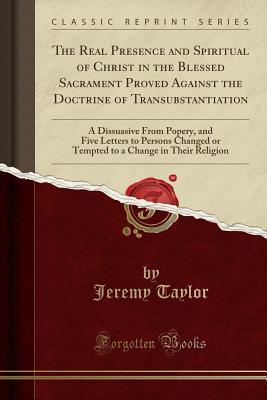Excerpt from The Real Presence and Spiritual of Christ in the Blessed Sacrament Proved Against the Doctrine of Transubstantiation: A Dissuasive From Popery, and Five Letters to Persons Changed or Tempted to a Change in Their Religion
Of the church: shewing that the church of Rome relies upon no cer tain foundation for their faith Of councils and their authority Of the canon law and the great contrariety in it Of the pope Of the notes of the church 2. Of the sufficiency of the holy scriptures to salvation, which is the great foundation and ground of the protestant religion Sufficiency of scripture proved by tradition 3. Of traditions, and those doctrines and practices that most need the help of that topic As of the Trinity, parade-baptism, baptism by heretics, and the Lord's day 4. There is nothing of necessity to be believed which the apostolical churches did not believe 5. That the church of Rome pretends to a power of introducing into the confessions of the church new articles of faith, and endeavours to alter and suppress the old catholic doctrine First, they do it, and pretend to a power of doing it Secondly, it agrees with their interest so to do 6. They use indirect ways to bring their new articles into credit; e. G. The device of Indices Expurgatory.
About the Publisher
Forgotten Books publishes hundreds of thousands of rare and classic books. Find more at www.forgottenbooks.comwww.forgottenbooks.com
This book is a reproduction of an important historical work. Forgotten Books uses state-of-the-art technology to digitally reconstruct the work, preserving the original format whilst repairing imperfections present in the aged copy. In rare cases, an imperfection in the original, such as a blemish or missing page, may be replicated in our edition. We do, however, repair the vast majority of imperfections successfully; any imperfections that remain are intentionally left to preserve the state of such historical works.
Of the church: shewing that the church of Rome relies upon no cer tain foundation for their faith Of councils and their authority Of the canon law and the great contrariety in it Of the pope Of the notes of the church 2. Of the sufficiency of the holy scriptures to salvation, which is the great foundation and ground of the protestant religion Sufficiency of scripture proved by tradition 3. Of traditions, and those doctrines and practices that most need the help of that topic As of the Trinity, parade-baptism, baptism by heretics, and the Lord's day 4. There is nothing of necessity to be believed which the apostolical churches did not believe 5. That the church of Rome pretends to a power of introducing into the confessions of the church new articles of faith, and endeavours to alter and suppress the old catholic doctrine First, they do it, and pretend to a power of doing it Secondly, it agrees with their interest so to do 6. They use indirect ways to bring their new articles into credit; e. G. The device of Indices Expurgatory.
About the Publisher
Forgotten Books publishes hundreds of thousands of rare and classic books. Find more at www.forgottenbooks.comwww.forgottenbooks.com
This book is a reproduction of an important historical work. Forgotten Books uses state-of-the-art technology to digitally reconstruct the work, preserving the original format whilst repairing imperfections present in the aged copy. In rare cases, an imperfection in the original, such as a blemish or missing page, may be replicated in our edition. We do, however, repair the vast majority of imperfections successfully; any imperfections that remain are intentionally left to preserve the state of such historical works.
BUY NOW
Paperback, 692 pages
Published November 30th 2018 by Forgotten Books
© 2025 Bibleportal.com 版权所有.

Jeremy Taylor was a clergyman in the Church of England who achieved fame as an author during The Protectorate of Oliver Cromwell. He is sometimes known as the "Shakespeare of Divines" for his poetic style of expression and was often presented as a model of prose writing. He is remembered in the Church of England's calendar of saints with a Lesser Festival on 13 August.
He went on to become chaplain in ordinary to King Charles I as a result of Laud's sponsorship. This made him politically suspect when Laud was tried for treason and executed in 1645 by the Puritan Parliament during the English Civil War. After the Parliamentary victory over the King, he was briefly imprisoned several times.
Eventually, he was allowed to live quietly in Wales, where he became the private chaplain of the Earl of Carbery. At the Restoration, his political star was on the rise, and he was made Bishop of Down and Connor in Ireland. He also became vice-chancellor of the University of Dublin.
Taylor's fame has been maintained by the popularity of his sermons and devotional writings rather than by his influence as a theologian or his importance as an ecclesiastic.
... Show more